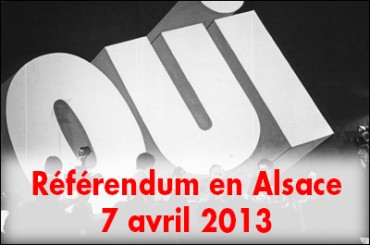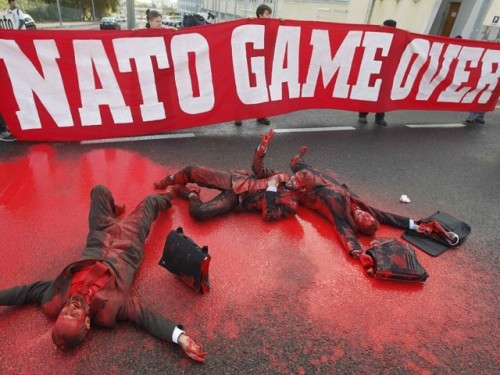
L’OTAN n’amène que la destruction, la pauvreté, l’insécurité et la misère.
Elle doit être abolie!
Apprécié pour la rigueur et la justesse de ses analyses le sociologue canadien Mahdi Darius Nazemroaya (*), 30 ans, s’est imposé comme un des meilleurs connaisseurs de l’OTAN. Ses investigations, traduites en de nombreuses langues, ont acquis une audience internationale et son ouvrage « The globalisation of NATO » [« La mondialisation de l’OTAN »] fait aujourd’hui référence. En 400 pages denses, fascinantes, préoccupantes, il nous fait prendre la mesure de la menace que l’OTAN fait peser sur la paix du monde et l’avenir de nombreux peuples. Il nous fait également prendre conscience de l’urgence qu’il y aurait à obtenir la dissolution de cette dangereuse organisation.
Silvia Cattori : Dans votre remarquable ouvrage vous mettez en lumière les stratégies mises en place par l’OTAN pour étendre son emprise militaire dans le monde. J’aimerais vous demander ce qui vous a motivé à consacrer tant d’énergie à un sujet aussi ardu et exigeant. Comment en êtes-vous venu à considérer que l’analyse du rôle de l’OTAN et des stratégies qu’elle a mises en place était une tâche absolument essentielle ?
Mahdi Darius Nazemroaya : Les graines de ce livre ont été semées en 2007. J’avais alors rédigé un petit manuscrit mettant en relation les guerres en Afghanistan et en Irak (qui avaient fait suite aux tragiques évènements du 11 septembre 2001) avec l’expansion de l’OTAN, le projet de bouclier antimissiles états-unien – que je décrivais comme s’étant finalement couvert du manteau d’un projet de l’OTAN, – et le concept de ce que les néoconservateurs et leurs alliés sionistes appellent « destruction créative » pour redessiner la restructuration des pays du Moyen-Orient, et l’encerclement aussi bien de la Chine que de la Russie.
J’ai toujours considéré que tous les évènements négatifs auxquels le monde est confronté étaient les éléments d’un ensemble ; ou de ce que le savant et révolutionnaire hongrois György Lukács a appelé « totalité fragmentée ». Les guerres en « série », l’accroissement des lois de sécurité, la guerre contre le terrorisme, les réformes économiques néolibérales, les « révolutions colorées » dans l’espace post-soviétique, la diabolisation de différentes sociétés par les médias, l’élargissement de l’OTAN et de l’Union Européenne, et les fausses accusations au sujet d’un programme d’armement nucléaire iranien font partie d’un tout. Un de mes articles publié en 2007 [1], posait également les principales bases de cette feuille de route et reliait tous les éléments de la guerre perpétuelle à laquelle nous assistons.
J’ai écrit ce livre parce que je pensais que c’était un sujet très important. J’ai lu la plupart des textes de l’abondante littérature concernant l’OTAN et aucun n’examine l’OTAN dans la perspective critique où je me place. De même qu’aucun ne relie l’OTAN de manière pertinente à une « vue d’ensemble » des relations internationales. Un chercheur de l’Université Carleton m’a dit que mon livre était comme une Bible des relations internationales et de tous ses sujets importants. Je vois moi aussi mon livre sur l’OTAN de cette manière.
Ma principale motivation pour écrire ce livre était d’amener les lecteurs à prendre conscience de la nature impérialiste des conflits internationaux modernes et de les aider à en voir la « totalité » au lieu de ses éléments « fragmentés ». Quand vous voyez l’ensemble, vous êtes en mesure de prendre de meilleures décisions. Je pense avoir donné de l’OTAN une évaluation correcte. Dans sa bibliothèque à Bruxelles il y a un exemplaire de mon livre. C’est l’OTAN elle-même qui a annoncé son acquisition comme l’une des ressources de sa bibliothèque, en novembre 2012. Ce livre est ma contribution, en tant que chercheur, pour essayer de permettre aux lecteurs de prendre des décisions en connaissance de cause en voyant au-delà des effets de miroirs et des éléments fragmentés du tableau.
Aujourd’hui dans le monde, les gens sont de façon générale plus instruits. Mais malheureusement l’ignorance se répand en ce qui concerne les relations de pouvoir et ce qui se passe dans ce domaine au niveau mondial. Nous entrons dans une ère trompeuse de l’histoire où beaucoup de gens à travers le monde sentent de plus en plus qu’ils ne peuvent rien faire d’autre que d’être des spectateurs impuissants, réduits à n’être que des particules, des rouages, ou des extensions d’une immense machine invisible sur laquelle ils n’ont aucun contrôle.
Les scénarios du livre de George Orwell « 1984 » se sont pour l’essentiel réalisés. Les gens sont devenus étrangers à leur monde et gouvernés de plus en plus par cette machine capitaliste invisible qui travaille à détruire toutes sortes de façon alternatives de vivre ou de penser ; l’ordre qui s’impose aujourd’hui à nous est comme un resserrement de la « cage d’acier » de Max Weber [2] qui réduit de plus en plus notre indépendance et nos mouvements.
La plupart des gens regardent maintenant les nouvelles et la télévision passivement. Ils essaient de se distraire de la réalité ; ils tentent d’engourdir leur conscience et de vivre dans un faux état de bonheur qui leur permet d’ignorer la réalité et les misères du monde. Collectivement, nos esprits ont été colonisés, on leur a fait croire à un faux ordre des choses. L’humanité est en train d’être de plus en plus déshumanisée. Peut-être que j’ai l’air hégélien, mais les gens deviennent étrangers à eux-mêmes. Ils deviennent aussi étrangers aux capacités de leur propre esprit et aux talents dont ils ont été dotés. Mais la vérité est que nous ne sommes pas séparés des évènements et des processus qui façonnent ce monde. Nous ne devrions pas devenir les esclaves des objets ou des structures de notre propre fabrication, que ce soit le capitalisme ou les structures politiques. Nous ne devons pas devenir de simples spectateurs de notre parcours de vie.
L’hégémonie est un processus continu de leadership, de contrôle, et d’influence qui implique à la fois la contrainte et le consentement. Mais son emprise n’est jamais totale et elle peut toujours être combattue. Nous voyons des défis à l’hégémonie dans la construction de blocs historiques qui affrontent les centres de pouvoir impérialistes et capitalistes. Le Mouvement bolivarien d’Hugo Chávez et l’ALBA sont des exemples réussis d’une contestation de l’hégémonie traditionnelle des élites compradores qui gouvernent la région au bénéfice de forces extérieures.
Silvia Cattori : Un grand chapitre passionnant et troublant de votre livre est consacré à l’Afrique. L’entrée en guerre de la France au Mali n’a pas dû être une surprise pour vous. La déstabilisation de ce pays affaibli, engendrée par l’intervention de la France en Libye, n’ouvre-t-elle pas une grave crise dans tous les pays du Sahel, de l’Atlantique à la Mer rouge ?
Mahdi Darius Nazemroaya : Dès le début j’ai soutenu que la division du Soudan, l’intervention française en Côte d’Ivoire soutenue par les États-Unis, et la guerre de l’OTAN en Libye, faisaient partie d’une deuxième « ruée vers l’Afrique ». J’ai expliqué que la guerre en Libye visait à déstabiliser d’autres parties de l’Afrique et aurait un effet d’entraînement sur une large partie de ce continent incluant des pays comme le Niger et le Mali.
Dans mon livre, j’ai examiné le Sahel qui est constitué par les terres intérieures de l’Algérie, du Niger, de la Libye, et du Mali. La guerre de l’OTAN contre la Libye a déclenché une réaction en chaîne, comme une démolition contrôlée, que les États-Unis et leurs alliés utilisent pour contrôler une vaste portion de l’Afrique et de ses ressources. Comme la première « ruée vers l’Afrique » qui a été déclenchée par une crise économique dans les pays industrialisés de l’Europe occidentale, ces évènements concernent en fait le contrôle des ressources. Alors que les États-Unis s’impliquaient davantage en Afrique, son gouvernement et le Pentagone se sont mis à parler de plus en plus de l’expansion des facilités dont disposait Al-Qaïda en Afrique et de la manière dont l’armée américaine et ses alliés devaient combattre cette organisation en augmentant leur présence sur le continent africain. En fait, les États-Unis ont constitué en 2011 un budget pour l’actuelle guerre au Mali sous le couvert de la lutte contre Al-Qaïda en Afrique de l’Ouest. Des intérêts stratégiques comme l’obsession grandissante des États-Unis pour le Golfe de Guinée et l’approvisionnement en pétrole en Afrique de l’Ouest sont occultés dans un récit qui nous parle de la lutte contre les groupes terroristes rangés sous le label d’Al-Qaïda. Nous savons d’expérience que l’Empire américain a en fait travaillé avec ces groupes, aussi bien en Libye qu’en Syrie. Et que l’on cherche à pousser hors d’Afrique la Chine, la Russie, l’Inde, le Brésil, et d’autres rivaux économiques du bloc occidental, mais on n’en parle pratiquement pas. En lieu et place, on déguise les intérêts des États-Unis et des ses alliés de l’OTAN comme la France, en objectifs altruistes visant à aider des États faibles.
Pour en revenir au Mali. Je n’ai pas été surpris quand le Président François Hollande et son gouvernement ont ordonné aux soldats français d’envahir ce pays. Aussi bien la France que les États-Unis sont très au fait des réserves de gaz et de pétrole au Mali, au Niger, et dans l’ensemble du Sahel. Mon livre traite de ces points et de la création par le gouvernement français, en 1945, d’un Bureau de recherches pétrolières dans le but d’extraire le pétrole et le gaz de cette région. Quelques années plus tard, en 1953, Paris a délivré des licences d’exploitation à quatre compagnies françaises en Afrique. En raison de ses craintes, à la fois des empiétements américains et des demandes africaines d’indépendance, Paris a créé l’Organisation Commune des Régions Sahariennes (OCRS) pour maintenir son contrôle sur les parties riches en ressources de ses territoires africains qui possèdent du pétrole, du gaz, et de l’uranium. L’uranium a été important pour garantir l’indépendance de la France vis-à-vis de Washington par la création d’une force de dissuasion nucléaire stratégique, en riposte au monopole anglo-américain.
Ce n’est donc pas un hasard si les zones du Sahel que les États-Unis et ses alliés ont désignées comme faisant partie de la zone où Al-Qaïda et les terroristes sont situés correspondent à peu près aux frontières de l’OCRS, riche en énergie et en uranium. En 2002, le Pentagone a commencé d’importantes opérations visant à contrôler l’Afrique de l’Ouest. Cela a eu lieu sous la forme de l’Initiative Pan-Sahel, qui a été lancée par l’US European Command (EUCOM) et l’US Central Command (CENTCOM). Sous la bannière de ce projet de l’armée américaine, le Pentagone a formé des troupes du Mali, du Tchad, de la Mauritanie, et du Niger. Les plans visant à établir l’Initiative Pan-Sahel remontent toutefois à 2001, lorsque l’Initiative pour l’Afrique a été lancée à la suite des attentats du 11 septembre. Sur la base de l’Initiative Pan-Sahel, la Trans-Saharan Counter-terrorism Initiative (TSCTI) a été lancée en 2005 par le Pentagone sous le commandement du CENTCOM. Le Mali, le Tchad, la Mauritanie, et le Niger ont été rejoints par l’Algérie, le Maroc, le Sénégal, le Nigeria, et la Tunisie. La TSCTI a été transférée en 2008 au commandement de l’AFRICOM récemment activé. Il faut relever que le capitaine Amadou Sanogo, le leader du coup d’État militaire qui a eu lieu au Mali le 21 mars 2012, est l’un des officiers maliens qui ont été formés dans le cadre de ces programmes américains en Afrique de l’Ouest.
L’analyse du coup d’État de 2012 au Mali montre qu’il s’agit d’un acte criminel. Le coup d’État militaire a renversé le Président Amadou Toumani Touré sous prétexte qu’il ne pouvait pas restaurer l’autorité malienne sur le nord du pays. Le Président Amadou était sur le point de quitter son poste et n’avait pas l’intention de rester dans la vie politique, et les élections allaient avoir lieu dans moins de deux mois. Ce coup d’État a essentiellement empêché une élection démocratique d’avoir lieu et l’action du capitaine Sanogo a mis fin au processus démocratique au Mali et a déstabilisé le pays. Sa nouvelle dictature militaire a été reconnue par l’OTAN et par le gouvernement installé en Côte d’Ivoire par les Français. Les États-Unis ont continué à financer le gouvernement militaire du Mali et des délégations militaires et civiles des États-Unis et d’Europe occidentale ont rencontré le régime militaire de Sanogo. Peu après, la France a déclaré qu’elle avait le droit d’intervenir en Afrique partout où ses citoyens et ses intérêts étaient menacés. C’était autant de préliminaires.
Les armes qui sont utilisées au Mali et au Niger aussi bien par les groupes terroristes que par les tribus touaregs sont liées aux actions de l’OTAN en Libye. Plus précisément ces armes viennent des arsenaux libyens pillés, et des armes envoyées en Libye par les Français, les Anglais et les Qataris. L’OTAN a eu un rôle direct dans ce domaine et l’on sait que les Français ont soudoyé les groupes touaregs et ont contribué à les armer et à les financer durant la guerre contre la Libye. Du reste, en Afrique, les Français ont toujours manipulé les Touaregs et les Berbères contre d’autres groupes ethniques à des fins coloniales.
Par ailleurs, les tensions entre le Soudan et le Sud-Soudan sont attisées. La région soudanaise du Darfour et la Somalie sont toujours des points chauds. Tout cela fait partie d’un arc africain de crise qui est utilisé pour restructurer l’Afrique et l’englober dans les frontières du bloc occidental.
Silvia Cattori : Quand sous l’impulsion du président Sarkozy, après 33 ans de retrait, la France est revenue dans le commandement militaire de l’OTAN, il n’y a eu aucune protestation. N’est-ce pas le signe que les citoyens ignorent, que cette organisation menace l’humanité et que l’appartenance de leur pays à l’OTAN implique sa subordination à la politique étrangère belliciste de Washington et la perte de sa souveraineté ?
Mahdi Darius Nazemroaya : Je pense que ce que le Président Sarkozy a fait en réintégrant la France dans le commandement militaire de l’OTAN est largement le reflet d’un consensus au sein de la classe politique française. Je sais qu’à Paris de nombreuses voix politiques l’ont critiqué, mais si au sein de la classe politique française l’opposition avait été intransigeante, elle aurait pu faire beaucoup plus que parler. Aujourd’hui, les membres de l’establishment politique français, aussi bien à « gauche » qu’à « droite », se battent entre eux pour savoir qui va le mieux servir les centres impérialistes et capitalistes à Washington et à New York. L’establishment politique français ne fait pas cela parce qu’il est particulièrement pro-américain, mais parce qu’il est au service du système mondial corrompu qui sert lui-même le capitalisme global dont le centre en voie d’affaiblissement est aux États-Unis. Ainsi, nous avons aussi besoin de réévaluer ce qu’est l’anti-américanisme, ou d’où proviennent et ce que représentent en fait les sentiments anti-américains.
De larges segments de l’élite de l’Europe occidentale sont au service de ce système mondial parce que leurs propres intérêts y sont investis et y sont liés. Comme les États-Unis sont en voie d’affaiblissement et en lutte pour maintenir leur primauté mondiale en tant que centre du capitalisme, de la régulation et de l’accumulation capitaliste, ils vont de plus en plus déléguer leurs missions impériales à des pays comme la France. On verra également davantage de compromis entre les États-Unis et des pays alliés comme la France et l’Allemagne. Il s’agit là d’une décentralisation dialectique du pouvoir des États-Unis visant à renforcer l’hégémonie du système mondial et à maintenir l’Empire américain par délégation. Il faut noter que ce système capitaliste mondial est fragmenté en blocs, raison pour laquelle nous voyons des rivalités entre les États-Unis, la Chine et la Russie.
De façon générale, la majorité des citoyens dans de nombreuses sociétés sont de plus en plus passifs vis-à-vis des décisions de leurs gouvernements et de leurs dirigeants. C’est le reflet d’un sentiment croissant d’aliénation, de détachement et d’impuissance qui a transformé les êtres humains en marchandises et en objets. Cela fait partie du resserrement de la « cage d’acier » dont je parlais plus haut, en termes weberiens.
Silvia Cattori : La France a été au commencement, avec le Qatar, le principal « parrain » de la déstabilisation de la Syrie [3]. La Chine et la Russie ont empêché par leurs vétos l’adoption d’une résolution du Conseil de sécurité qui aurait autorisé une intervention militaire de l’OTAN comme cela a été le cas en Libye. Mais on peut se demander si les pays de l’OTAN et leurs alliés arabes ne sont pas en train de réaliser leur plan de déstabilisation de la Syrie par d’autres voies ? Et pensez-vous que la Chine et la Russie pourront durablement contenir l’OTAN tant que les pays émergents n’auront pas leur mot à dire et les moyens d’imposer un véritable multilatéralisme au Conseil de sécurité ?
Mahdi Darius Nazemroaya : En premier lieu, il faut voir que les évènements en Syrie font partie d’une guerre par procuration menée par les États-Unis, l’OTAN, Israël et les dictatures arabes (comme l’Arabie Saoudite), contre la Chine, la Russie, l’Iran et leurs alliés. Deuxièmement, quand on considère les évènements en Syrie d’un point de vue international, on devrait penser à la Guerre civile espagnole qui a éclaté avant la Deuxième guerre mondiale. De même, on peut considérer les évènements en Libye et en Afrique, et peut-être les invasions antérieures de l’Afghanistan et de l’Irak, en pensant à l’invasion de la Chine par le Japon ou l’invasion de la Tchécoslovaquie par l’Allemagne avant la Deuxième guerre mondiale. Cela ne signifie pas que la Syrie ou ces évènements soient nécessairement le prélude à une Troisième guerre mondiale, mais ils ont le potentiel d’allumer un vaste incendie au niveau mondial — à moins que l’on ne pense que tous ces évènements font déjà partie de la Troisième guerre mondiale.
 Les thèses de Giovanni Arrighi sur les cycles systématiques d’accumulation dans le « système-monde » peuvent nous aider à trouver une base de réflexion. Son travail est important parce que nous pouvons l’utiliser pour lier entre eux, de la Syrie à l’Afrique, les éléments dont nous parlions en termes de « totalité fragmentée » constituant le système mondial. Les cycles d’accumulation étudiés par Arrighi se rapportent à des périodes de temps qui s’étendent sur une centaine d’année ou plus, durant lesquelles le centre du capitalisme dans le système mondial se situe dans un lieu géographique ou un pays donné. Ses thèses sont fortement influencées par les travaux du savant français Fernand Braudel sur l’expansion du capitalisme. Pour Arrighi ces centres d’accumulation ont été les pouvoirs hégémoniques du système mondial en expansion. À la dernière étape de chaque cycle, les capitalistes déplacent leurs capitaux de ces centres dans d’autres endroits et finalement dans le nouveau centre capitaliste qui a émergé. Ainsi, chronologiquement, le pouvoir hégémonique du système mondial a été transféré de la ville-État italienne de Gênes aux Pays-Bas, puis en Grande Bretagne et, finalement, aux États-Unis. Le déplacement géographique du centre du système mondial se produit au cours d’une période de crise, au moins pour les anciens centre capitalistes, et dans un court laps de temps. Nous en arrivons aujourd’hui à la Chine. Ce qui se passe est que le centre du capital est sur le point de sortir des États-Unis. Si l’on suit la tendance soulignée par Arrighi, alors le prochain centre d’accumulation capitaliste du système mondial sera la Chine. Toutefois d’autres scénarios ne sont pas à écarter, comme une direction globale de toutes les principales puissances capitalistes. En me référant aux travaux d’Arighi, je veux dire ici que nous avons affaire à un système capitaliste mondial qui inclut la Chine et la Russie. Ni les États-Unis ni la Chine ni la Russie ne veulent perturber ce système. Ils sont en compétition pour en devenir le centre d’accumulation capitaliste. C’est pourquoi aucune des parties ne veut une guerre directe. C’est pourquoi les Chinois n’ont pas utilisé la dette étrangère américaine pour dévaster l’économie des États-Unis ; la Chine souhaite voir un transfert ordonné du centre d’accumulation depuis les États-Unis.
Les thèses de Giovanni Arrighi sur les cycles systématiques d’accumulation dans le « système-monde » peuvent nous aider à trouver une base de réflexion. Son travail est important parce que nous pouvons l’utiliser pour lier entre eux, de la Syrie à l’Afrique, les éléments dont nous parlions en termes de « totalité fragmentée » constituant le système mondial. Les cycles d’accumulation étudiés par Arrighi se rapportent à des périodes de temps qui s’étendent sur une centaine d’année ou plus, durant lesquelles le centre du capitalisme dans le système mondial se situe dans un lieu géographique ou un pays donné. Ses thèses sont fortement influencées par les travaux du savant français Fernand Braudel sur l’expansion du capitalisme. Pour Arrighi ces centres d’accumulation ont été les pouvoirs hégémoniques du système mondial en expansion. À la dernière étape de chaque cycle, les capitalistes déplacent leurs capitaux de ces centres dans d’autres endroits et finalement dans le nouveau centre capitaliste qui a émergé. Ainsi, chronologiquement, le pouvoir hégémonique du système mondial a été transféré de la ville-État italienne de Gênes aux Pays-Bas, puis en Grande Bretagne et, finalement, aux États-Unis. Le déplacement géographique du centre du système mondial se produit au cours d’une période de crise, au moins pour les anciens centre capitalistes, et dans un court laps de temps. Nous en arrivons aujourd’hui à la Chine. Ce qui se passe est que le centre du capital est sur le point de sortir des États-Unis. Si l’on suit la tendance soulignée par Arrighi, alors le prochain centre d’accumulation capitaliste du système mondial sera la Chine. Toutefois d’autres scénarios ne sont pas à écarter, comme une direction globale de toutes les principales puissances capitalistes. En me référant aux travaux d’Arighi, je veux dire ici que nous avons affaire à un système capitaliste mondial qui inclut la Chine et la Russie. Ni les États-Unis ni la Chine ni la Russie ne veulent perturber ce système. Ils sont en compétition pour en devenir le centre d’accumulation capitaliste. C’est pourquoi aucune des parties ne veut une guerre directe. C’est pourquoi les Chinois n’ont pas utilisé la dette étrangère américaine pour dévaster l’économie des États-Unis ; la Chine souhaite voir un transfert ordonné du centre d’accumulation depuis les États-Unis.
La Chine et la Russie ne changeront pas leurs politiques et leurs positions sur la Syrie ou l’Iran, mais elles veulent éviter une guerre qui perturbe le système capitaliste mondial. Bien sûr, les États-Unis essaient de maintenir leur position en tant que centre du système mondial, par la force brute, ou en impliquant leurs alliés et vassaux dans leurs opérations impérialistes, comme au Mali et en Libye.
Silvia Cattori : Vous consacrez un long chapitre (p 67 à 113) à l’intervention de l’OTAN en Yougoslavie. Pouvez-vous résumer pour nos lecteurs ce à quoi cette guerre, qui a démembré un pays et généré tant de souffrances, devait aboutir ?
Mahdi Darius Nazemroaya : Le démantèlement de la République fédérative socialiste de Yougoslavie a été une étape importante pour ouvrir les portes d’une expansion vers l’Est de l’OTAN et de l’Union Européenne. Il a ouvert la route pour la marche vers les frontières de la Russie et de l’ex-Union soviétique. L’ex-Yougoslavie était aussi un obstacle majeur vis-à-vis du projet euro-atlantique de l’OTAN et de l’UE en Europe. En outre, la guerre de l’OTAN en Yougoslavie a permis de préparer la logistique des guerres en Afghanistan et en Irak.
Silvia Cattori : Denis J.Halliday [4] écrit dans la préface de votre ouvrage : « L’OTAN n’amène que la destruction, la pauvreté, l’insécurité et la misère. Elle doit être abolie ». Quand on sait qu’il n’y a aucun mouvement qui s’oppose à la guerre, que des ONG comme Amnesty, HRW, MSF, MDM, prennent le parti de l’ingérence militaire des grandes puissances, comme on l’a vu en ex-Yougoslavie, au Soudan, en Libye, en Syrie, que peut-on suggérer à toute une jeunesse en quête de justice et désireuse d’agir pour un monde meilleur ? Que peuvent faire concrètement les peuples européens contre la machine destructrice de l’OTAN ?
Mahdi Darius Nazemroaya : Comme je l’ai dit, nous en sommes arrivés à la situation décrite par George Orwell dans son roman “1984”. Amnesty International, Human Rights Watch, et une grande partie des ONG de l’industrie humanitaire sont des outils de l’impérialisme pratiquant les deux poids deux mesures. Les organisations d’aide étrangère sont profondément politiques et politisées. Cela ne signifie pas que tous leurs employés soient de mauvaises gens qui ne veulent pas aider le monde. Bon nombre de leurs employés et des bénévoles sont des gens estimables ; ils ne comprennent pas tous les faits et ils ont de bonnes intentions. Ces gens ont été trompés ou aveuglés par la pensée de groupe institutionnelle. Leurs esprits devraient être débarrassés de tous les préjugés et de la désinformation dont ils ont été nourris ; une véritable tâche de dévouement.
Les citoyens des pays de l’OTAN doivent travailler à se positionner eux-mêmes pour informer leurs sociétés respectives sur l’OTAN et finalement les influencer pour qu’elles se retirent de cette organisation. Cela peut être fait de diverses manières. Mais cela commence par une compréhension de ce qu’est l’OTAN et une connaissance non censurée de son histoire.
Je ne suis pas une autorité morale ou un stratège. Se maintenir soi-même sur la bonne voie est déjà un défi assez difficile, je pense. Je n’ai aucun droit à pontifier sur la façon dont les gens devraient vivre. Je vais toutefois vous dire ce que je pense personnellement. À mon avis, le plus gros problème pour beaucoup de gens est qu’ils veulent changer le monde à une beaucoup trop grande échelle sans s’attaquer aux problèmes immédiats dans leurs propres vies. Je trouve que la meilleure manière de changer le monde est de commencer par de petits pas dans notre vie de tous les jours. Je parle ici d’ « échelle » et pas de « changement graduel » ou de « rythme ». Faire un monde meilleur commence par votre environnement immédiat. Le changement commence avec vous-même et ceux qui vous entourent, tout comme le devrait la charité. Imaginez si la plupart des gens faisaient cela ; le monde serait changé par petites étapes qui aboutiraient collectivement à un changement monumental. Rien de tout cela ne peut non plus se faire sans patience et détermination, et je souligne encore une fois qu’action et connaissance ne devraient pas être séparées. Je ne sais que dire de plus.
Silvia Cattori : En mettant ensemble les pièces du puzzle vous démontrez magistralement dans votre livre comment ces guerres en série, menées sous des prétextes humanitaires, s’inscrivent dans une stratégie de « destruction créative » conçue par « les néoconservateurs et leurs alliés sionistes », et comment – de la Yougoslavie, à l’Afghanistan, à l’Irak et à la Libye – elles sont toutes liées. Des personnalités de premier plan, comme l’ancien Secrétaire général adjoint de l’ONU Denis J. Halliday qui a préfacé votre ouvrage, vous donnent entièrement raison : l’OTAN est bel et bien le principal danger pour la paix du monde. Mais vous savez qu’en Europe, notamment dans les pays où, comme en France, les organisations juives ont une forte emprise sur les politiques et les médias, dénoncer la stratégie des néoconservateurs et de leur allié Israël [5], ou dénoncer les révolutions colorées suffit à vous faire cataloguer comme « théoricien du complot » et à vous écarter du débat. Que peut-on faire à votre avis pour modifier cette désespérante situation ?
Mahdi Darius Nazemroaya : Mon expérience (au Canada) est différente. On ne m’a jamais qualifié de théoricien du complot. Je pense que la censure des médias et le mépris systématique sont des tactiques clés utilisées contre ceux qui remettent en question le récit dominant ou les opinions énoncées par les forces hégémoniques qui dominent la société. L’objectif visé en diabolisant des personnes ou des groupes sous le qualificatif de « théoriciens du complot » est de les discréditer et de les neutraliser. Cela se produit généralement quand ils ont beaucoup attiré l’attention et quand ils ont aussi quelques idées fausses qui peuvent être ridiculisées et liées à leurs positions. Néanmoins, ceux qui se voient qualifiés de théoriciens du complot ne devraient pas laisser cette accusation les dissuader de maintenir leurs positions et de continuer à s’adresser aux gens. Car la démoralisation fait partie de la tactique utilisée pour réprimer les points de vue et réflexions « dérangeantes ».
Les groupes et les lobbies sionistes ont une présence forte et disproportionnée dans le domaine politique et dans les médias de plusieurs pays, mais il faut reconnaître qu’ils ne sont pas homogènes et qu’ils ne sont pas les seuls facteurs influents ; ils font partie d’un bloc d’intérêts pour qui il est important d’empêcher qu’un discours critique n’ébranle les forces hégémoniques qui dominent aujourd’hui la société. Et les lobbies sionistes ne sont pas tous liés à Israël. Il arrive qu’un groupe sioniste travaille à introduire et à imposer à Israël des projets externes. Les motivations de ces groupes ne sont pas toutes les mêmes, mais elles font partie du programme dominant qui s’est développé en ce que les renommés sociologues Giovanni Arrighi et Immanuel Wallerstein ont appelé « système-monde » [ou « économie-monde »].
À mon humble avis, être entendu est la chose la plus importante. Internet et les réseaux sociaux ont contribué à ce processus. Je pense que, pour être entendu, il est également important de proposer des analyses rigoureuses et bien articulées. C’est une tâche difficile qui doit être accomplie, et qui fait partie d’un processus culturel plus large incluant l’éducation et la rééducation. Modifier les forces hégémoniques dominant la société ne peut se faire qu’en établissant de nouveaux courants de pensée pouvant contester leur hégémonie. La critique ne suffit pas non plus, une alternative et un meilleur programme doit être articulé et proposé. La critique en elle-même est inutile si l’on n’offre pas parallèlement un programme alternatif. Pensée et action doivent également être liées dans un processus pratique.
Silvia Cattori : Votre livre va-t-il être traduit en français ? A-t-il eu la couverture médiatique lui permettant de toucher un large public ?
Mahdi Darius Nazemroaya : Mon livre devait être traduit en français en trois volumes par un éditeur en France, mais malheureusement l’accord a fait long feu. En notre temps où la durée d’attention s’amenuise, peu de gens sont intéressés à lire un livre de plus de 400 pages. Très peu d’attention lui a été accordée de la part des grands médias. Il y a plusieurs mois, Le Monde Diplomatique à Paris a contacté mon éditeur aux États-Unis, ainsi que la maison qui le diffuse en Grande Bretagne, pour leur demander l’envoi d’un exemplaire. Je ne sais pas si Le Monde Diplomatique a réellement l’intention de faire une recension d’un livre aussi critique et, très honnêtement, je ne m’en soucie pas vraiment.
Mon ouvrage a eu de bonnes critiques disant que c’est un livre à lire absolument. Il est diffusé dans les universités et les collèges. On en trouve des exemplaires dans les bibliothèques de diverses institutions comme l’Université de Harvard et l’Université de Chicago. Il est référencé à la Haye et dans la prestigieuse collection de la Bibliothèque du Palais de la Paix aux Pays-Bas qui tient à jour les livres relatifs aux lois internationales. Sur Amazon au Royaume Uni, il est classé comme l’un des meilleurs livres sur l’OTAN et je crois qu’il est en train de prendre un bon départ.
Silvia Cattori
Mahdi Darius Nazemroaya est un sociologue interdisciplinaire, auteur primé, et analyste politique connu. Il est chercheur au Centre de recherche sur la mondialisation à Montréal, collaborateur expert de la Strategic Culture Foundation à Moscou, et membre du Comité scientifique de la revue de géopolitique Geopolitica, en Italie.
Sur son ouvrage « The Globalization of NATO »,
voir également (en anglais) : http://www.silviacattori.net/article4005.html http://www.silviacattori.net/article3834.html http://www.silviacattori.net/article3780.html
Article traduit de l’anglais par JPH
[1] Publié d’abord sous le titre « La mondialisation de l’OTAN » puis sous le titre modifié « La mondialisation de la puissance militaire : l’expansion de l’OTAN » . Cet article a été traduit en de nombreuses langues, y compris en arabe par la chaîne qatari d’information Al-Jazeera.
[2] La « cage d’acier » (ou « cage de fer ») est un concept sociologique introduit par Max Weber qui se réfère à la rationalisation accrue de la vie sociale, en particulier dans les sociétés capitalistes occidentales. Ainsi la « cage d’acier » enferme les individus dans des systèmes fondés uniquement sur l’efficacité, le calcul rationnel et le contrôle.
[3] Voir : « Gérard Chaliand dit quelques vérités sur la Syrie » : http://www.silviacattori.net/article3350.html « Syrie : Les victimes de l’opposition armée ignorées » : http://www.silviacattori.net/article3416.html
[4] L’Irlandais Denis J. Halliday a passé une bonne partie de sa carrière auprès des Nations Unies, impliqué dans des actions d’aide humanitaire. En 1997, il fut nommé Sécrétaire général adjoint et directeur du programme humanitaire en Irak. Un an plus tard, après 34 ans de service au sein des Nations Unies, Halliday a annoncé sa démission en raison des sanctions économiques imposées à l’Irak, qu`il a qualifiées de « génocide ». En 2003, il a reçu Le Gandhi International Peace Award. Depuis son départ des Nations Unies, Denis Halliday a participé de manière active dans plusieurs actions contre la guerre et les crimes contre l’humanité. Il est présentement membre de l’Initiative de Kuala Lumpur en vue de « criminaliser la guerre ».
[5] Par exemple, l’écrivain israélien Israël Shamir, a été accusé d’antisémitisme par Olivia Zemor, Nicolas Shahshahani et Dominique Vidal pour avoir affirmé en 2003 cette vérité : qu’Israël et le lobby juif avaient joué un rôle prépondérant dans la guerre qui devait démembrer l’Irak un pays qu’Israël voulait mettre à genoux.



 Cofundador del Comité d’Action de Défense des Belges à l’Áfrique (CADBA), constituído en julio de 1960, inmediatamente después de las violaciones de Leopoldvlile y de Thysville, de las que fueron víctmas los belgas de Congo y cofundador del Mouvement d’Action Civique que sucedió al CADBA, el belga JeanThiriart, en diciembre de 1960, lanzó la organización Jeune Europe, que durante varios meses será el principal sostén logístico y base de retaguardia de la OAS-Metro.
Cofundador del Comité d’Action de Défense des Belges à l’Áfrique (CADBA), constituído en julio de 1960, inmediatamente después de las violaciones de Leopoldvlile y de Thysville, de las que fueron víctmas los belgas de Congo y cofundador del Mouvement d’Action Civique que sucedió al CADBA, el belga JeanThiriart, en diciembre de 1960, lanzó la organización Jeune Europe, que durante varios meses será el principal sostén logístico y base de retaguardia de la OAS-Metro.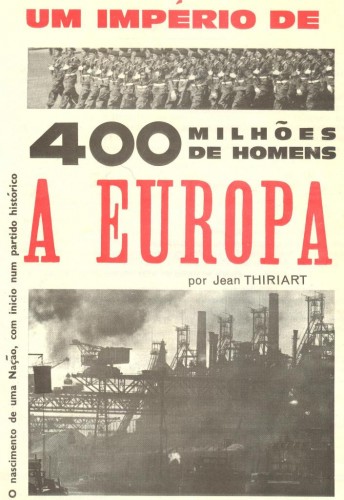

 del.icio.us
del.icio.us
 Digg
Digg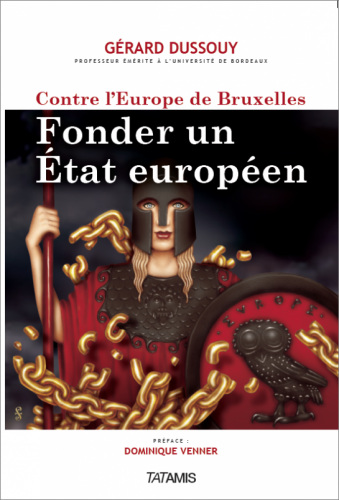
![[Lecture] Contre l’Europe de Bruxelles – Fonder un Etat européen, par Gérard Dussouy](http://fr.novopress.info/wp-content/uploads/2013/04/dussouy_modifie-1.jpg)
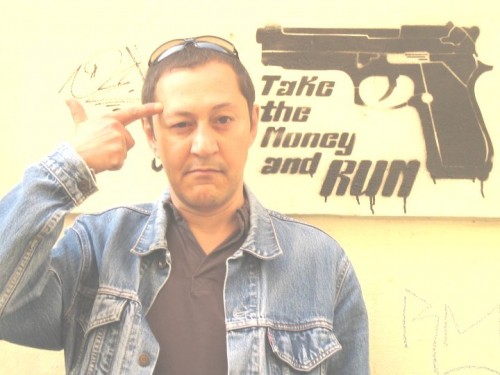

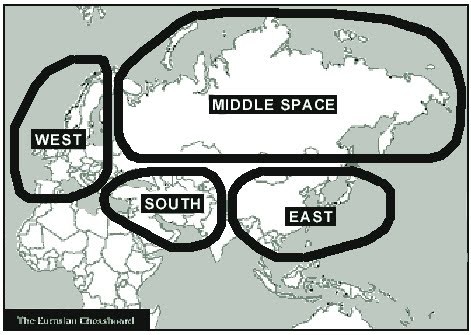




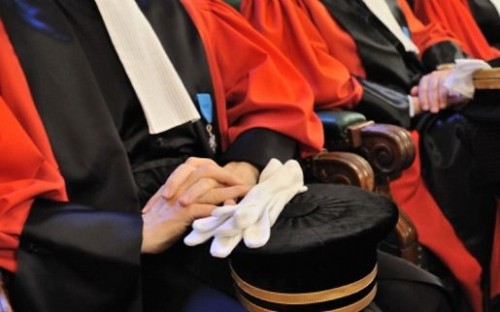
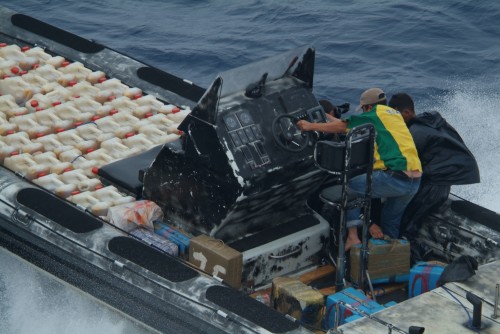
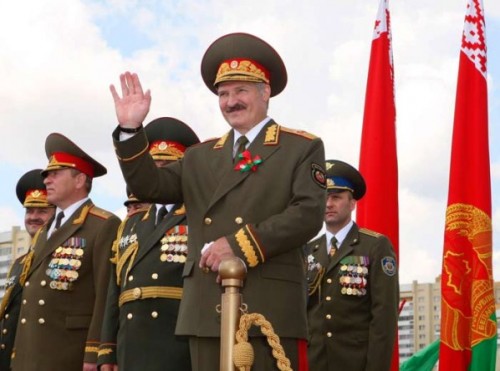

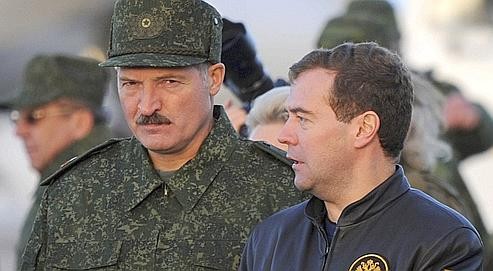
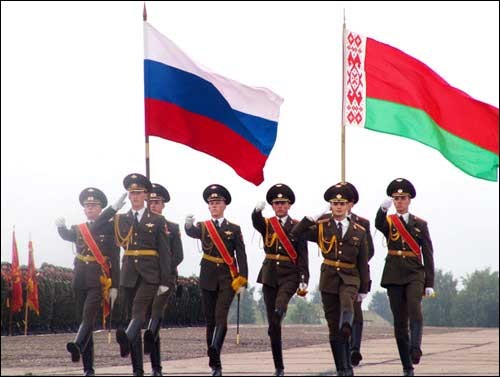

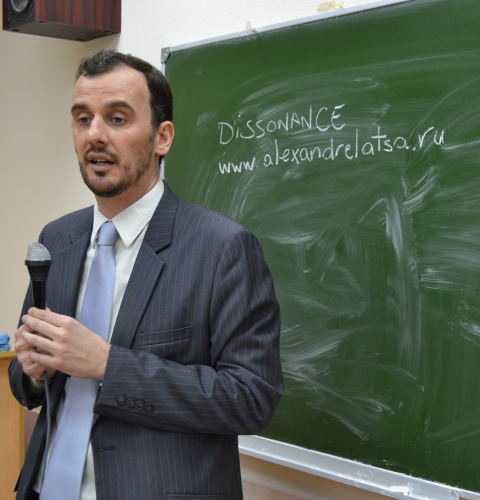

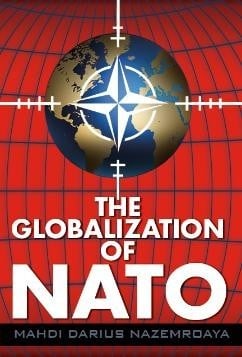
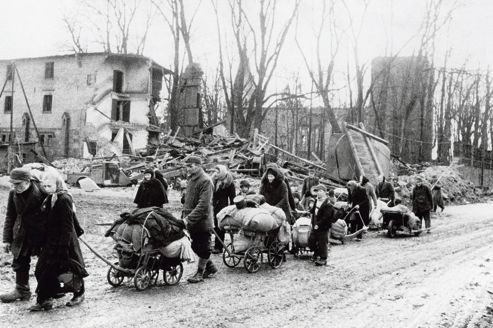
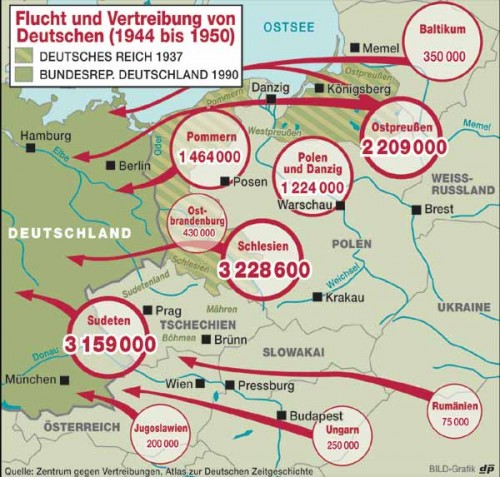
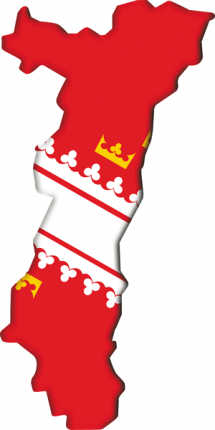 Les Français ignorent que le 7 avril 2013, les électeurs des départements du Bas-Rhin et du Haut-Rhin sont convoqués à un scrutin référendaire régional. On leur demande d’approuver ou non la fusion dans une collectivité territoriale unique du conseil régional d’Alsace et des deux conseils généraux départementaux. Le succès de cette consultation dépend d’un oui majoritaire dans les deux départements et d’une participation minimale de 25 % sous peine de nullité.
Les Français ignorent que le 7 avril 2013, les électeurs des départements du Bas-Rhin et du Haut-Rhin sont convoqués à un scrutin référendaire régional. On leur demande d’approuver ou non la fusion dans une collectivité territoriale unique du conseil régional d’Alsace et des deux conseils généraux départementaux. Le succès de cette consultation dépend d’un oui majoritaire dans les deux départements et d’une participation minimale de 25 % sous peine de nullité.
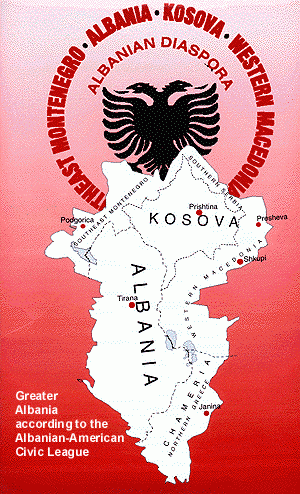 Wednesday, December 5, 2012, the Albanian Prime Minister Sali Berisha advocated granting Albanian citizenship to all Albanians, wherever they reside. This statement was made during a visit of the city of Vlora where the independence of the Albanian state was declared, only 100 years ago. At the time Albania had just liberated itself from Ottoman rule.
Wednesday, December 5, 2012, the Albanian Prime Minister Sali Berisha advocated granting Albanian citizenship to all Albanians, wherever they reside. This statement was made during a visit of the city of Vlora where the independence of the Albanian state was declared, only 100 years ago. At the time Albania had just liberated itself from Ottoman rule.

